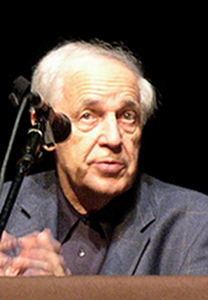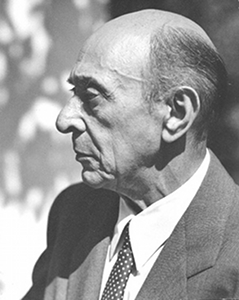SCHONBERG EST MORT !Even this week I am not going to slow down at all with the provocations therefore I borrowed a sentence by Pierre Boulez, that in 1951, after the recent passing of Arnold Schonberg gave this title to his article for the English magazine " The Score ". Now let me explain you why I have chosen it.
Pierre Boulez Arnold Schonberg Let's start from where I interrupted. First of all, I want to emphasize that I have nothing against Zimmerman and Barenboim, they are both professionals who undoubtedly face their job with seriousness, even if not with big enthusiasm. Job seriousness is very difficult to be meet , therefore it is worthy of respect. But let's go back to Schonberg . After his death, Boulez urged the composers to repudiate the dodecaphonic ideas of Schönberg and convey their forces towards the language of the future. Fairly, I estimate and highly appreciate Boulez as orchestra director; in New York and eventually in Chicago as well, he did remarkable things, but, to tell the truth, I was never so enthusiastic about him as a composer .However, in this way of thinking, there is a full knowledge of the stalemate in which classic music language had been stuck already in those years. More than about stalemate, I would rather speak about regression, we have to think that even Schonberg , in the last twenty-five years of his life, had reviewed his dodecaphonic theories to a big extent, renouncing almost totally to them and making a step towards the post romantic chromatism. There was the desire to search and move towards something new and different. If the scenery of the new classical music was considered as stagnant already in the '50s, now it can be defined as totally dead and I believe that this is one of the main reasons why nowadays there are no high leveled players as there were once. I recently read the biography of one of these great figures of the past, Nathan Milstein, in which his cultural world, and the one of great people like him is described. Milstein performed Glazunov's concert at thirteen years in front of the author, he cooperated with Rachmaninov for the orchestra, he played conducted by Strauss. Richter worked side by side with Prokofiev, Sostakovic has written its concerts for Ojstrakh. When Horowiz was born, Chopin was died since less than fifty years, and his music was still relatively young.. The music they played was alive! What they played, matched with what they lived for and this is the reason why some play of these great ones remain milestones, crossing time in the same way as compositions did. In my opinion, this is one of the greatest problems of today's classical music. It is a closed and self celebrating bundle without the smallest trace of adherence to reality ; it is music of an other world and another time. Unfortunately, when any form of life more does not succeed to evolve any more, thus adapting to the environment, it is inexorably headed to death. Also the definition of Classical music is by now obsolete. Furthermore, even the music concept is obsolete, it would be more opportune to speak of sound. A couple of years ago I worked to a project with some engineers of the signal elaboration department at CNR in Pisa. We were developing a framework for the sound management in the digital domain. It has been like getting in touch with a parallel world, nobody was able to read a musical note on a staff , but they knew how to interpret and understand a spectral image. I do not know how to explain it to you, but if I say them that the Oboe give the LA so that the orchestra can tune up, they do not understand me, but if I say that it emits a sound to 442Hz, they knew exactly what I was speaking about . It is like being a step below music, not yet turned into notes, and this closer contact with the matter, compared to the classic nomenclature, contributes to the birth of new expressive forms. To allow the existence of musicians who do not know how to read notes. Like Bad Sector, aka Massimo Magrini, making Noise and Ambient music, and that has kindly granted us the use of his Kosmos piece for the soundtrack of our site. Massimo is a musician and an artist, he does not read the notes, but the sounds he produces and creates may transmit feelings to those one listening to them. It may happen that, sometimes , these feelings are not pleasant, but life , both real and everyday one , surely does not have the same harmonious echoes that must have inspired Schubert when he wrote the Trout. Today we live in big and noisy cities, and this is what we hear, unfortunately not singing birds and wallowing fishes. So long Paolo.
|
   |







